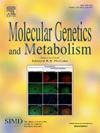bh4反应性苯丙酮尿症患者在疾病期间短期使用蛋白质替代品的临床应用
IF 3.5
2区 生物学
Q2 ENDOCRINOLOGY & METABOLISM
引用次数: 0
摘要
目的苯丙酮尿症(PKU)是一种代谢性疾病,主要通过饮食苯丙氨酸(Phe)限制和/或四氢生物蝶呤(BH4)治疗。对bh4有反应的PKU患者,饮食自由化通常是可能的;然而,代谢控制可能在分解代谢应激(如疾病或发烧)期间受损。本研究的目的是研究临时蛋白质替代(无phe氨基酸混合物)的效果;在不限制饮食蛋白质的情况下,bh4反应性PKU患者在疾病期间的PFAAM)。方法采用回顾性、描述性研究方法,对10例接受BH4单药治疗的BH4反应性PKU患者进行研究。所有患者仅在发热或疾病相关发作时接受PFAAM补充。临床、生化和遗传数据来自医疗记录。在疾病发作期间摄入PFAAM前后测定血液Phe水平。结果所有患者在发热性疾病期间,尽管给予最大BH4剂量(20 mg/kg/天),血液Phe水平均显著升高。以0.3-1.5 g/kg/天的中位剂量开始补充PFAAM可导致血液Phe水平迅速下降,通常在几天内。在大多数病例中,一旦代谢控制恢复,PFAAM就会逐渐停用,没有患者需要长期限制Phe饮食。干预允许恢复代谢控制,同时保持自由的饮食方案。结论:间断性疾病期间临时补充PFAAM似乎是BH4治疗的有效辅助,可控制血液Phe水平的短暂升高。这种方法可能支持bh4反应性PKU患者的代谢稳定,而不需要永久性的饮食限制。需要进一步的前瞻性研究在更大的队列中验证这些结果。本文章由计算机程序翻译,如有差异,请以英文原文为准。
The clinical utility of short-term protein substitute use during intercurrent illness in BH4-responsive phenylketonuria
Objective
Phenylketonuria (PKU) is a metabolic disorder that is primarily treated with dietary phenylalanine (Phe) restriction and/or tetrahydrobiopterin (BH4) therapy. Dietary liberalization is often possible in BH4-responsive PKU patients; however, metabolic control may be impaired during catabolic stress such as illness or fever. The aim of this study was to investigate the efficacy of temporary protein substitution (Phe-free amino acid mixture; PFAAM) during intercurrent illness in BH4-responsive PKU patients managed without dietary protein restriction.
Methods
This retrospective case series, descriptive study included ten BH4-responsive PKU patients treated with BH4 monotherapy. All patients received PFAAM supplementation exclusively during febrile or disease-related episodes. Clinical, biochemical and genetic data were obtained from medical records. Blood Phe levels were determined before and after PFAAM intake during illness episodes.
Results
All patients experienced a significant increase in blood Phe levels during febrile illnesses despite receiving maximum BH4 dose (20 mg/kg/day). PFAAM supplementation initiated at a median dose of 0.3–1.5 g/kg/day resulted in a rapid decrease in blood Phe levels, often within a few days. In most cases, PFAAM was gradually discontinued once metabolic control was restored, and no patient required long-term dietary Phe restriction. The intervention allowed restoration of metabolic control while maintaining a liberal dietary regimen.
Conclusions
Temporary PFAAM supplementation during intercurrent illness appears to be an effective adjunct to BH4 therapy to control transient elevations in blood Phe levels. This approach may support metabolic stability without the need for permanent dietary restriction in BH4-responsive PKU patients. Further prospective studies are needed to validate these results in larger cohorts.
求助全文
通过发布文献求助,成功后即可免费获取论文全文。
去求助
来源期刊

Molecular genetics and metabolism
生物-生化与分子生物学
CiteScore
5.90
自引率
7.90%
发文量
621
审稿时长
34 days
期刊介绍:
Molecular Genetics and Metabolism contributes to the understanding of the metabolic and molecular basis of disease. This peer reviewed journal publishes articles describing investigations that use the tools of biochemical genetics and molecular genetics for studies of normal and disease states in humans and animal models.
 求助内容:
求助内容: 应助结果提醒方式:
应助结果提醒方式:


